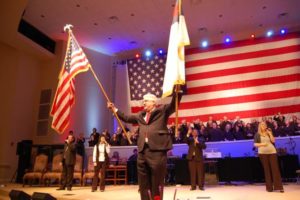So every once in a while I have to grit my teeth through some inappropriate mixture of nationalist sentiment with Christian worship or teaching. We all know that “patriotism,” love of one’s home place and relations and culture, one’s “homeland” and its people, is a basic good. And “patriotism” can be expressed a variety of ways: the loyal soldier in a just war is one kind of patriot, as is the family who waits and prays and works to heal the society wounded by war, as are those who work hard to make justice and peace prevail among the people. There are also “patriots” who risk their lives and fortunes, pledging their honor for the justice of their cause, to change wicked regimes for better ones. There are “patriots” who counsel their nation wisely, and provide just laws; there are “patriots” who plead with their people to leave behind wicked customs and laws. Jeremiah was a patriot, and God had to specifically instruct him not even to pray for the good of his people–and Jeremiah was hated by his rulers, and kidnapped by those who loved him but did not understand God’s message.
So when we sing hymns to one of the nations of this world in a service that ought to be wholly concerned with the communion of the People of God with their God, united in all times and places to the Sacrifice of Christ, bringing with them all of their humanity and nothing that will not endure in the Kingdom, I am pretty much appalled. I can understand some songs that are prayers to God on behalf of those who serve–the Anglican hymn “Eternal Father, Strong to Save” is perhaps the best of the breed, and if I really strive to interpret it carefully “America, the Beautiful” is not the worst (though it still addresses the nation, rather than God). But other songs, which manifestly divert our attention from God to nation, have no place whatsoever in Christian worship–here I think of “My Country, ‘Tis of Thee,” a song which I would love were I not so frustrated by its perversion of worship.
And I do not say that one should not, in whatever measure the regime can merit, have separate civic songs and ceremonies. I can no longer pledge allegiance to the United States of America with a clean conscience, but I could for much of my life, and did; I can’t really sing “The Star-Spangled Banner” these days without revulsion, but I learned five verses of it in Kindergarten and can still sing all of them by heart. I can still sing more verses of “The Battle Hymn of the Republic” than, I’ll warrant, most of you have ever learned. But I cannot ignore the appalling heresy that song preaches so vigorously, anymore.
And so when there is an actual meeting of worship or teaching that is definitely under the auspices of the Church and designed to integrate us all more deeply into the Body of Christ, I am utterly convinced that there ought not be nationalist hymns or flags or other marks of devotion to a regime. Certainly, we ought to pray for those in authority, and certainly the Church is herself a real earthly power as well as the beachhead and embassy of an heavenly Kingdom, but any relationship to the nation we entertain within the service of worship or the catechetical session ought to be strictly a matter of diplomacy with a foreign power. And like any diplomacy, it ought to be measured; sublimated to our real interests; and subject to our observations of whether that power is friendly, neutral, hostile, or at war with us.
I ask you, then, whether you would not find yourself thinking of the church service as “their service” rather than “our service,” if there were prominent displays of devotion to this flag?

Or, perhaps, to bring the matter home, if my parish were to prominently display this flag? We have several wonderful friends from this nation in our parish, these days:
There is certainly nothing wrong with loving home and hearth, kin and country, and even loving the King or Queen or Republic, if they are virtuous. And not promoting devotion to these, when they are vicious, does not mean loving home and hearth, kin and folk and people and place, any less; and it does not necessarily mean being disobedient (unless and until the regime can be replaced with a more just one). It just means making sure that when we enter the Kingdom of God, we make sure all other regimes are understood to be foreign; that we do not permit any culture to “capture” the communion of the saints in our time and place.
The use of Latin at Mass is an obvious way to help correct this. The strict derogation of all nationalist symbols away from the sacred precinct is another.
So this is blatantly unacceptable, and should horrify any well-formed Christian (also, anybody with a modicum of decent taste):
But even this, I would argue, is too strong a conflation of kingdoms:
(We can talk about the “Christian Flag,” which I pledged along with the American flag and the Bible at least six times a week through all my school years, until I realized the “Christian Flag” had no meaning whatsoever as a flag and quit pledging my allegiance to vague nothings, another day.)
So I very definitely and intentionally remove flags and other symbols of devotion to any regime from any space where Christian service or teaching will be held, in the same way as I prepare the space with Bible, crucifix, image of Our Lady, and other proper marks of the devotion that belongs to the People of God entering the Kingdom of God.
And I am convinced that you should do this, too.



